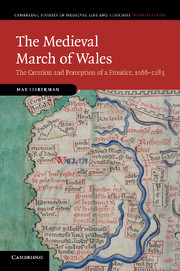Book contents
- Frontmatter
- Contents
- List of maps
- List of tables and illustration
- Preface
- List of abbreviations
- INTRODUCTION
- 1 A BORDER REGION?
- 2 THE MAKING OF A BORDER ARISTOCRACY
- 3 WARFARE AND DIPLOMACY
- 4 THE EXTENT AND NATURE OF THE MILITARY FRONTIER
- 5 THE MILITARIZATION OF SOCIETY
- 6 THE SHAPING OF ADMINISTRATIVE TERRITORIES
- 7 THE BORDER LORDSHIPS AND THE ENGLISH STATE
- CONCLUSION
- Select bibliography
- Index
5 - THE MILITARIZATION OF SOCIETY
Published online by Cambridge University Press: 06 July 2010
- Frontmatter
- Contents
- List of maps
- List of tables and illustration
- Preface
- List of abbreviations
- INTRODUCTION
- 1 A BORDER REGION?
- 2 THE MAKING OF A BORDER ARISTOCRACY
- 3 WARFARE AND DIPLOMACY
- 4 THE EXTENT AND NATURE OF THE MILITARY FRONTIER
- 5 THE MILITARIZATION OF SOCIETY
- 6 THE SHAPING OF ADMINISTRATIVE TERRITORIES
- 7 THE BORDER LORDSHIPS AND THE ENGLISH STATE
- CONCLUSION
- Select bibliography
- Index
Summary
Besides the threat and incidence of frontier warfare, treated chronologically in Chapter 3, and the evidence of the castles, analysed in Chapter 4, another approach to discussing the distinctiveness in military terms of the Shropshire–Powys border is to investigate the effects of frontier warfare on society. Again, there is a historiographical context to this approach. It has been argued, particularly by R. R. Davies, that the strategic exigencies of border warfare ensured that military institutions which were characteristic of early Norman England survived in the March long after they had become obsolete in England. The issue impinges, moreover, on debates on the meaningfulness and survival of the honor in England in the twelfth and thirteenth centuries, particularly insofar as that debate is concerned with the question of military retinues. It is also relevant to the question of how far the Welsh borderlands of Shropshire in the thirteenth century may have been similar to the marches in Ireland, to which military service had been exported from England and where it continued, throughout the thirteenth and fourteenth centuries, to be performed as an obligation arising from tenure of land. Given these ramifications, it is clearly important to ask whether frontier warfare created a distinctively militarized society on the Welsh borders.
- Type
- Chapter
- Information
- The Medieval March of WalesThe Creation and Perception of a Frontier, 1066–1283, pp. 173 - 188Publisher: Cambridge University PressPrint publication year: 2010



